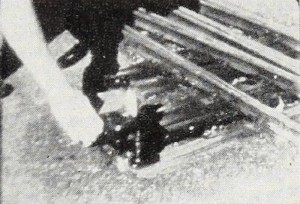
"The Southwestern and Centerville Railroad boasts a roadbed of less than two miles and runs only on Saturdays — and then to "nowhere." But it undoubtedly provides the favorite ride of all the kids (as well as their equally enthusiastic parents) from the surrounding countryside. In The Fresh Milk Line, Roy Fulmer, jr., records the operation of this narrow gauge railroad on a dairy farm in New Jersey, run as a hobby by the owner of the farm. Closeups of the working of the Diesel engine, the switches and signals add technical interest; while the sequence of laying a new piece of track by presumably adult employees on the farm makes it apparent that the men enjoy "working on the railroad" as much as would any youngster. Here is one film whose interest would have been heightened by a musical accompaniment with sound effects." Movie Makers, Dec. 1951, 412.
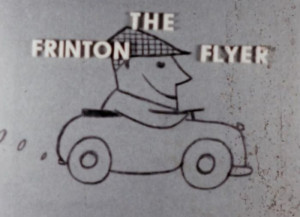
‘A frantic, speeded-up journey in a red Vauxhall Victor F-type, registration B90 F. The unidentified gentleman driver, presumably the filmmaker, hurries from the main Post Office in the High Street at Clacton-on-Sea, jumps in the car and heads north into Holland Road, through Holland-on-Sea to the Frinton Road, onwards to Kirby Cross and eventually to Glebe Way in Frinton-on-Sea, Essex. On reaching his destination, he parks in the drive and hurries indoors.
Vauxhall produced over 390,000 Victor cars between 1957 and 1976. It was a popular family-sized four-door saloon which became a huge success for the company with exports to all corners of the globe. The first version, branded the F series, offered an American-style curved windscreen and rear window, with additional ‘imported’ features, including the chromed front bumper design and sloping windscreen pillars. The exhaust pipe was concealed in the rear bumper detailing, visible below the offside lamp cluster towards the end of the film. The driving sequence of the film is shot at a slow frame rate, perhaps 6 or 8 frames-per-second, so that when projected at 24 frames-per-second the action is speeded up’ (BFI Player).
documentary
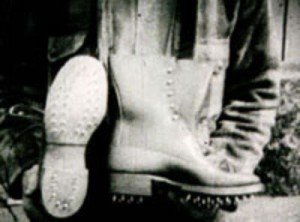
"Depicts the year-round activities of the Machias Lumber Company on the Machias River in Washington County, Maine. Includes scenes of winter logging in the forest with hand tools and horses, as well as the spring log drive, with loggers using peaveys to break up log jams on icy rivers as the logs are moved from the forest to the mill. Includes footage of lumber loaded onto schooners in Machias for transport to New York and schooner being towed to sea by sardine boat." oldfilm.org
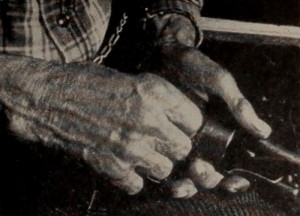
"A western, in color, about a drifter looking for work and then falling in love with his employer’s granddaughter." Church History Library.
"A rather clever and well-executed story of the rocket engineer who recovered the important capsule when it returned to earth. The rocket launching is done with miniature and to the credit of the filmer. The rocket engineer does not fully appreciate what he has accomplished until it is too late. Sound effects accompanying the picture create a sense of realism" PSA Journal, Nov. 1959, 48.
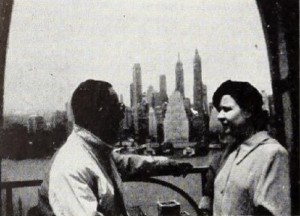
"There have been in the past, and will be in the future, a number of fine amateur films portraying the great moment of marriage, the ecstatic happiness of the honeymoon. But these films have featured, by and large, the young in age those blythe favorites of the Gods of Love with whom no fervor can seem foolish, no endearment an awkward jest. Not so in From This Day Forward. The protagonists here are people of adult experience and mature mind. But though no longer young in years, they are superbly and inseparably young in spirit. This quality, as well as good taste and graciousness — which are overtones more often missing with the young — illumines each charming foot of From This Day Forward. Othon Goetz enhances this spirituality in every phase of his production. His impeccable camera work seems to glow — where another's would merely sparkle. His compositions are so inevitable as to seem effortless, while his editing adds pace to an already attractive picture." Movie Makers, Dec. 1951, 410.
"From Touchdown to Takeoff is a student made film showing the inspections and preparations a big airliner must undergo from the time it lands at an airport until it can take off again on the next flight" PSA Journal, Aug. 1967, 37.
Frontiersman is a religious film sponsored by the British and Foreign Bible Society and produced by Crawley Films.
Total Pages: 299